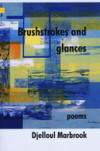Brushstrokes and Glances
A lovely gallery of a book. The poet contextualizes his museum/art-inspired poems in a note at the end of the book. His mother, Juanita Rice Guecione and aunts, Dorothy and Irene Rice (Pereira) were visual artists and they, and museums, have long fueled his imagination. In fact, he cannot imagine his life, he says, without them. Poems in the collection were informed by artworks in The Brooklyn Museum, The Metropolitan Museum of Art, The Chelsea Museum, The Museum of Modern Art, The Frick, art forgeries, artwork he has encountered in journals, and his mother’s paintings, among other works.
A lovely gallery of a book. The poet contextualizes his museum/art-inspired poems in a note at the end of the book. His mother, Juanita Rice Guecione and aunts, Dorothy and Irene Rice (Pereira) were visual artists and they, and museums, have long fueled his imagination. In fact, he cannot imagine his life, he says, without them. Poems in the collection were informed by artworks in The Brooklyn Museum, The Metropolitan Museum of Art, The Chelsea Museum, The Museum of Modern Art, The Frick, art forgeries, artwork he has encountered in journals, and his mother’s paintings, among other works.
Having seen one of the exhibitions that served as a source for a poem in this book, a glorious exhibition of paintings by Pierre Bonnard at the Met in NY in 2009, I can see from personal experience how adeptly and creatively the poet moves from the visual to the verbal:
Bonnard, painter of ghosts,
his table is set,
mirror indifferent.
May we come in?
Only on second thought perhaps.
Our first thought is
this is not for us,
it is for Marthe
and visitors.
Are we them
or are we not to know?
May we eat?
If we do
what will happen?
The poem is much like the paintings in the exhibition, deceptively simple, satisfying in a totally visceral way, both inviting and intimate, yet still somehow far off, apart, unknowable, to be admired from a distance. The viewer/reader wants to enter and partake of its abundance, but knows the scene was set for someone else.
Marbrook is something of a philosopher: “We need a museum to show us / we can unbind our captive lives,” he writes in “Picasso’s Bull.” “There’s so much for the dead to miss, / why don’t the living die of sorrow?” he asks in “Francisco de Zurbarán.” “Truth is / we all have an asymmetrical face,” he claims in “We are all Van Gogh.”
In “Accordion of worlds,” he concludes: “We will fly / when we’re not proud. / Until then we have museums.” And, thanks to Marbrook, lovely, smart poems about museums.





